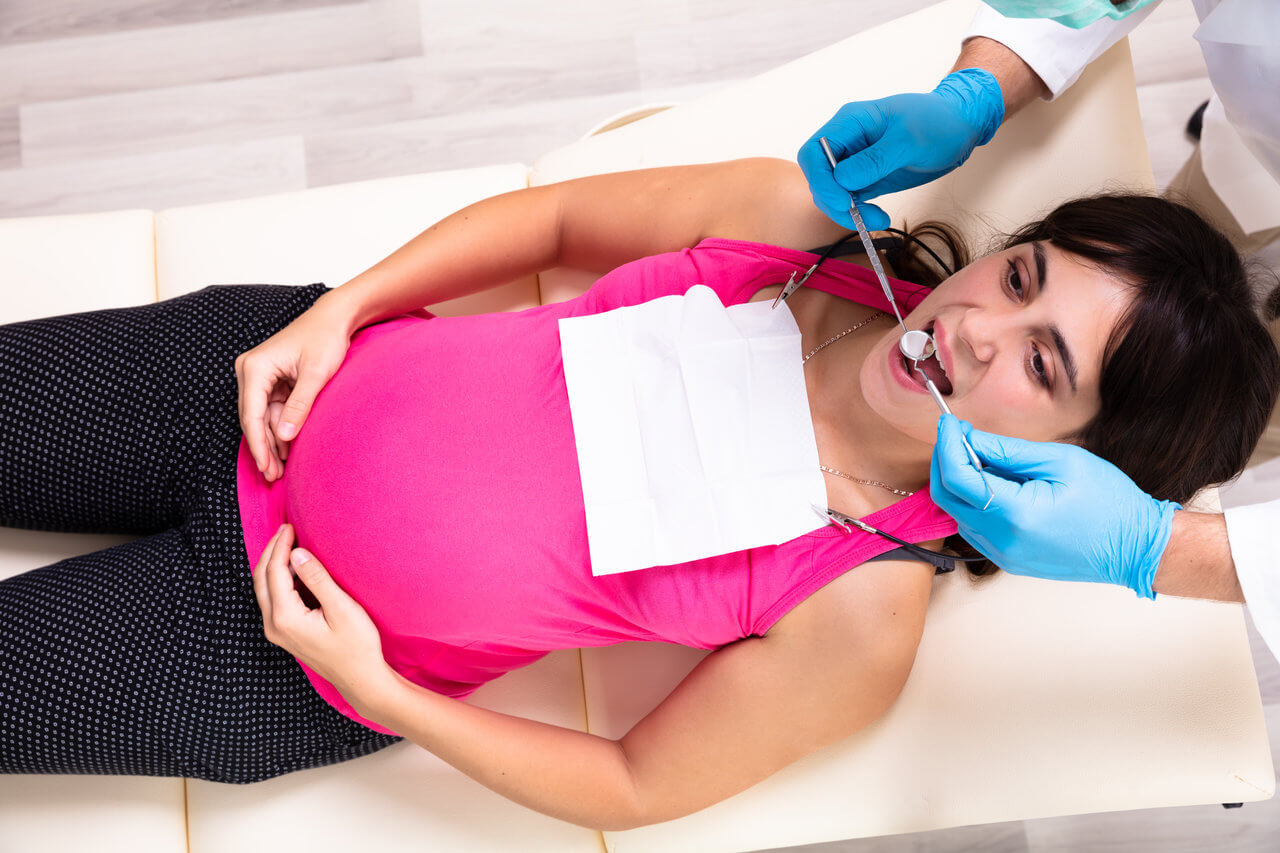There is an old wives’ tale that you lose a tooth for each baby, which is false, and the reasons could be due to the underlying changes during pregnancy.” Patient arrives, and you greet and ask about her health. She beams a beautiful smile and says that she’s expecting a baby! How do you reassure her that the old wives’ tale of losing a tooth for every baby is not going to happen to her?
Studies have shown that women who have tooth problems (periodontal disease) are more likely to give birth prematurely, have babies with a low birth weight, and possibly even more likely to miscarry. There are infections causing miscarriage which are Toxoplasmosis, a protozoal infection, may cause a miscarriage, death of the fetus, and serious birth defects.Listeriosis, a bacterial infection, increases the risk of preterm labor, miscarriage, and stillbirth.
Pregnancy brings a unique situation. Being pregnant comes with many responsibilities – and the way you care for your teeth is no exception. As your body progresses through each term, your cells increasingly retain fluids, including your gum tissues. Coupled with elevated hormone level, this can cause a heightened inflammatory response to the presence of plaque, resulting in puffy, inflamed gums in expectant mothers. Those puffy gums make you more susceptible to periodontal disease.
If you are planning on getting pregnant, it is more convenient to have elective procedures done before you conceive. Pregnancy and dental work questions are common for expecting moms. Preventive dental care and annual exams during pregnancy are not only safe but are recommended. Thus, you are less likely to have dental problems during pregnancy if you already have good oral hygiene habits. Few tips to follow – brush your teeth atleast twice daily with fluoridated toothpaste, floss between your teeth, visit your dentist regularly.
Dental care precautions during pregnancy, such as cavity fillings and crowns, should be treated to reduce the chance of infection. If dental work is done during pregnancy, the second trimester is ideal and to maintain healthy circulation by keeping your legs uncrossed while you sit on the dental chair and take a pillow to help keep you and the baby more comfortable. Once you reach the third trimester, it may be very difficult to lie on your back for an extended period of time. The safest course of action is to postpone all unnecessary dental work until after the birth. However, sometimes emergency dental work, such as a root canal or tooth extraction, is necessary. Elective treatments, such as teeth whitening and other cosmetic procedures, should be postponed until after the birth. It is best to avoid this dental work while pregnant and avoid exposing the developing baby to any risks, even if they are minimal.
Before you have your dental appointment, check with your obstetrician to see if she has any special precautions or instructions for you. Tell your dentist the names and dosages of all drugs you are taking – including medications and prenatal vitamins prescribed by your doctor. Dentist may need to alter your dental treatment plan based on this information.
Some things which need to be taken under consideration and are asked by expecting mom are:
Medications used in dental work during pregnancy: Currently, there are conflicting studies about possible adverse effects on the developing baby from medications used during dental work. Lidocaine is the most commonly used drug for dental work. Lidocaine does cross the placenta after administration. If dental work is needed, the amount of anaesthesia administered should be as little as possible, but still enough to make you comfortable. Lidocaine with epinephrine is safe, but as with any patient, proper aspiration is required for effective anaesthesia and to avoid the cardiovascular side effects of epinephrine. Too rapid a heartbeat and systemic vasoconstriction can lead to fetal hypoxia. Dental work often requires antibiotics to prevent or treat infections. Antibiotics such as penicillin, amoxicillin, cephalosporin and clindamycin, are safe to use in pregnancy, which may be prescribed after your procedure. Tetracycline of any type should be avoided during pregnancy and breastfeeding to avoid any discoloration of the teeth. Aspirin and other nonsteroidal, anti- inflammatory drugs (e.g. ibuprofen) should not be prescribed. For severe pain, oxycodone is considered safe. Codeine, hydrocodone, or propoxyphene are probably safe for a short time. Nitrous oxide is controversial but probably safe as long as there is oxygen administered. But as said before, a consent form from the obstetrician is required at the dentist to check the drugs and dosages to be given.

X-rays safe during pregnancy: Dental X-rays can be done during pregnancy. Your dentist will use extreme caution to safeguard you and your baby, such as shielding your abdomen and thyroid. Advances in technology have made X-rays much safer today than in past decades.
Pregnancy gingivitis: Beginning in the second or third month of pregnancy, about half of pregnant women experience gingivitis due to increased estrogen and progesterone. Pregnancy gingivitis typically peaks during the third trimester. Women who have gingivitis before pregnancy are more prone to exacerbation during pregnancy. Thus, rise in hormone levels during pregnancy causes the gums to swell, bleed, and trap food causing increased irritation to your gums, talk to your dentist or periodontist as soon as possible. Undiagnosed or untreated periodontal disease – pregnancy may worsen this chronic gum infection, which is caused by untreated gingivitis and can lead to tooth loss. Pregnancy epulis or pyogenic granuloma – a localised enlargement of the gum, which can bleed easily. This may require additional professional cleaning, and rarely excision.
Coping with Morning Sickness: If morning sickness is keeping you from brushing your teeth, change to a bland-tasting toothpaste during pregnancy. Ask your dentist or hygienist to recommend brands. Morning sickness is common and may cause permanent damage to the tooth enamel. The patient should rinse her mouth with water after vomiting rather than causing further damage with toothbrush abrasion. If you don’t have a fluoridated mouthwash, put a dab of fluoridated toothpaste on your finger and smear it over your teeth. Rinse thoroughly with water. Erosion oftoothenamelmaybemorecommon because of increased exposure to gastric acid from vomiting secondary to morning sickness, gastric reflux during late pregnancy.
Dental caries: Brush your teeth along the gum line twice a day with a small, soft toothbrush and fluoride toothpaste. It’s also a good idea to visit your dentist before you conceive. Dental treatment before pregnancy can help to keep your teeth and gums healthy and reduce the risk of premature birth, tooth decay could simply mean a woman has increased risk for premature birth and not that her tooth decay was what caused her baby’s premature birth. Thus, tooth decay would be a risk factor for premature birth but not necessarily a cause of premature birth.

Eating right for your teeth and baby: Avoid sugary snacks. Sweet cravings are common during pregnancy. However, keep in mind that the more frequently you snack, the greater the chance of developing tooth decay. Eat a healthy, balanced diet. Your baby’s first teeth begin to develop about three months into pregnancy. Healthy diets containing dairy products, cheese, and yogurt are a good source of these essential minerals and are good for baby’s developing teeth, gums, and bones.
Some pregnant women find that brushing their teeth, particularly the molars, provokes retching. However, you risk tooth decay if you don’t brush regularly:
- Use a brush with a small head, such as a brush made for toddlers.
- Take your time. Slow down your brushing action.
- It may help to close your eyes and concentrate on your breathing.
- Try other distractions, such as listening to music.
- If the taste of the toothpaste seems to provoke your gag reflex, switch to another brand. Alternatively, brush your teeth with water and follow up with a fluoridated mouthwash. Go back to brushing with fluoridated toothpaste as soon as you can.

Increase your calcium during pregnancy: You need to increase your daily amount of calcium during pregnancy. Sufficient calcium will protect your bone mass and meet the nutritional needs of your developing baby, but it is possible that mom may lose some of her bone density to help supply the baby’s skeletal requirements. This calcium loss is quickly made up after breastfeeding is stopped. Good sources of dietary calcium include products such as milk, cheese, unsweetened yoghurt, calcium-fortified soymilk, fatty fish,
such as salmon, eggs.
Post Pregnancy: After you have had your baby, in case you experienced any gum problems during your pregnancy, see your dentist soon after delivery to have your entire mouth examined and periodontal health evaluated.
‘A woman has two smiles that an angel might envy, the smile that accepts a lover before words are uttered, and the smile that lights on the first-born baby, assures it of a mother’s love.’
About the author
Dr. Vishaj S. Maru is a dental surgeon. She studied dentistry at the D.Y. Patil School of Dentistry. She does clinical practice in Mumbai with a keen interest in academia and clinical dentistry.

